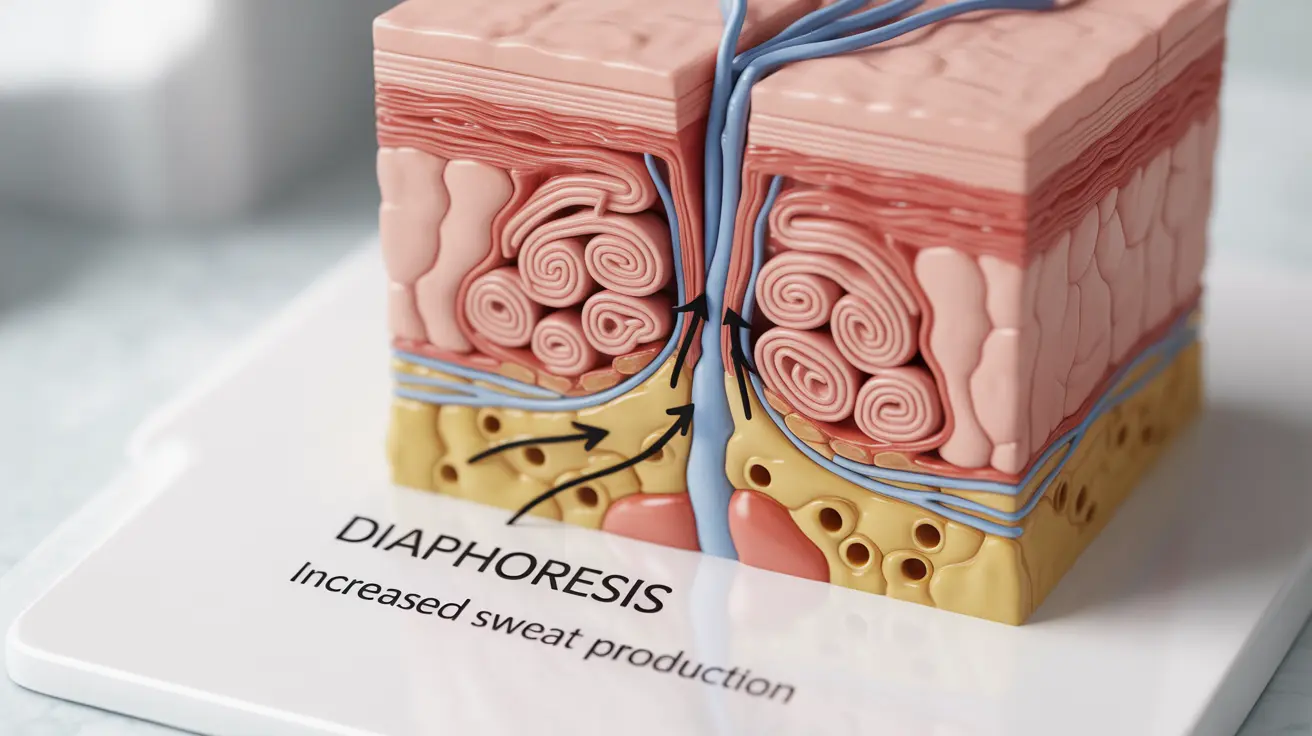Diaphoresis, or excessive sweating, is more than just a response to heat or physical activity. This medical condition can significantly impact daily life and may signal underlying health issues that require attention. Understanding the causes, recognizing warning signs, and knowing available treatments can help you better manage this condition and know when to seek medical help.
While some degree of sweating is normal and healthy, diaphoresis goes beyond typical perspiration, often occurring without obvious triggers and potentially affecting any part of the body. This comprehensive guide explores the medical aspects of excessive sweating and what it might mean for your health.
Medical Conditions Associated with Diaphoresis
Several medical conditions can trigger excessive sweating, including:
- Heart conditions (heart attack, heart failure)
- Endocrine disorders (hyperthyroidism, diabetes)
- Infections and fever
- Certain types of cancer
- Neurological conditions
- Anxiety disorders and panic attacks
Understanding these associations is crucial for proper diagnosis and treatment, as diaphoresis can sometimes be the first indication of a serious underlying condition.
Identifying Serious Cases of Diaphoresis
Not all excessive sweating indicates a medical emergency, but certain patterns and accompanying symptoms warrant attention:
- Night sweats that soak through bedding
- Sudden onset of excessive sweating without clear triggers
- Sweating accompanied by chest pain or difficulty breathing
- Cold, clammy skin with sweating
- Sweating with unexplained weight loss
Treatment Approaches for Diaphoresis
Treatment options vary depending on the underlying cause and severity of symptoms:
Medical Interventions
- Prescription antiperspirants
- Oral medications (anticholinergics)
- Botulinum toxin injections
- Iontophoresis (electrical current therapy)
- Surgical options for severe cases
Lifestyle Modifications
- Wearing breathable fabrics
- Avoiding trigger foods and beverages
- Stress management techniques
- Regular exercise (in appropriate conditions)
- Maintaining a healthy weight
External Factors Affecting Sweating
Various external factors can influence diaphoresis, including:
Medications
- Antidepressants
- Blood pressure medications
- Hormone treatments
- Pain medications
- Diabetes medications
Hormonal Changes
Hormonal fluctuations, particularly during menopause, pregnancy, or hormonal disorders, can significantly impact sweating patterns. These changes may require specific management strategies and medical consultation.
When to Seek Medical Attention
Immediate medical evaluation is necessary if you experience:
- Chest pain or pressure with sweating
- Sweating with fever and chills
- Excessive sweating that starts suddenly
- Night sweats without explanation
- Sweating that significantly impacts daily activities
Frequently Asked Questions
1. What are the common medical conditions that cause diaphoresis besides heat or exercise?
Common medical conditions causing diaphoresis include hyperthyroidism, diabetes, infections, heart conditions, certain cancers, and anxiety disorders. Each condition may present with different patterns of sweating and additional symptoms.
2. How can I tell if my excessive sweating (diaphoresis) is a sign of a serious health problem?
Consider it potentially serious if sweating is accompanied by chest pain, fever, unexplained weight loss, night sweats, or if it significantly interferes with daily activities. These combinations of symptoms warrant medical evaluation.
3. What treatment options are available to manage or reduce diaphoresis?
Treatment options range from prescription antiperspirants and oral medications to more advanced interventions like iontophoresis or Botox injections. The appropriate treatment depends on the underlying cause and severity of symptoms.
4. Can medications or hormonal changes like menopause cause excessive sweating?
Yes, various medications and hormonal changes can trigger diaphoresis. Common culprits include antidepressants, blood pressure medications, and hormonal fluctuations during menopause or pregnancy.
5. When should I seek medical help for sudden or severe episodes of diaphoresis?
Seek immediate medical attention if excessive sweating occurs with chest pain, difficulty breathing, fever, or if you experience unexplained night sweats. Also consult a healthcare provider if sweating significantly impacts your quality of life.




